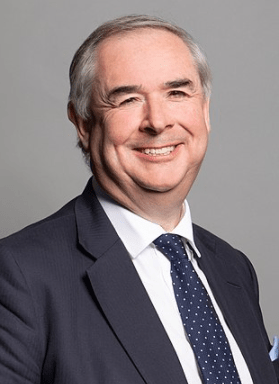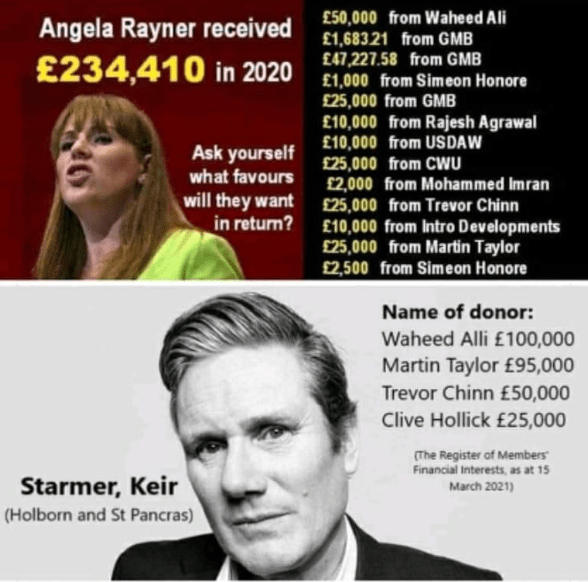Were it not for the fact that so much corruption, theft and embezzlement is hidden by a deliberate veil of secrecy, the capitalist system would not last a week. It is a system that is rotten to the core, and if the majority of the population could see how the rich and super-rich rig the system in their favour, they would be reaching for the pitchforks. But fortunately for the corrupt and greedy, they can usually rely on the mainstream media to make sure that people are not made aware of what goes on.
Once in a while, however, the veil lifts, and the stink of corruption wafts out. Hence, this week’s revelation about Tory sleaze has made an immediate impact on public perceptions and on the polling figures of the Tory Party. The revelation that Tory MP Owen Paterson had made half a million from his job as a lobbyist, for a company that subsequently got multi-million-pound public contracts has been revealed for all to see.

Randox given contract without having the right equipment
The company, Randox, got a contract worth £133m for Covid testing, only days before it was confirmed that they did not have enough of the right equipment. Having an MP in a key position lobbying on your behalf clearly pays off.
Under the impression that he is bullet-proof, Boris Johnson at first tried to support Paterson, using the pretext of a ‘review’ of the rules governing MPs’ behaviour, but in fact to spare his friend’s blushes at the proposed 30-day suspension from the House. However, the ensuing publicity was so unfavourable that Johnson was forced to climb down within a day, and those Tory MPs who had been strong-armed into supporting Paterson were left infuriated by his climbdown.
Not that Johnson is at all apologetic – a politician who has made a political career out of lying is not going to accept any responsibility for being caught red-handed trying to move the goalposts. That is in addition to the fact that Johnson himself made over £4m from his outside interests in the last fourteen years as a ‘full-time’ politician.
To the embarrassment of the entire Tory Party, the Paterson issue has now grown so wide that many other Tory MPs are being questioned about their second jobs. Questions are being asked about who their real paymasters are and where their priorities lie – with the constituents who elect them, or the big companies that pay them wages far in excess of their lucrative parliamentary salaries? It is not the revelation that they are corrupt that has offended the sensibilities of Tory MPs – they all know that – but the fact that (for a change) it is all in the public eye.

“There is a media narrative about sleaze now”, complained one Tory MP to the Financial Times, “journalists are already trawling through the register of members’ interests. People are really angry with Boris” Not angry about a U-turn, per se, it should be noted, but for opening a nasty can of worms.
The issue risks ‘getting out of control’
The risk for the government, according to David Liddington, former Tory cabinet minister, “is that if they don’t grip this, it could run out of control”. Getting ‘a grip’ for Liddington, means getting it all back under wraps and away from the public gaze.
Meanwhile, following Paterson’s ignominious resignation, an even bigger spotlight has fallen on Geoffrey Cox, former Tory Attorney General (ie head ‘law officer’ of the government), who has been making a fortune working on behalf of the government the British Virgin Islands. His MP’s salary – already far in excess of the average wage of his constituents in Torridge and West Devon – is dwarfed by the cool million he ‘earned’ working for the BVI. In fact, since 2009, The Guardian reveals, Cox has earned nearly £6m from legal work.
Having this kind of second job is a disgrace by itself, but Geoffrey Cox’s little earner in the Virgin Islands is reprehensible on so many levels. He was giving legal advice to a government faced with accusations of corrupt governance – so it could be argued that he is helping to defend money-laundering and other dubious practices for which the BVI is infamous. But it also seems that Cox took advantage of Covid ‘flexibility’ to stay in the Caribbean and cast parliamentary votes from there by proxy. Even when he was in Westminster, he apparently used his parliamentary office, paid for by the taxpayer, for his second job.
Cox and Tory spokespersons are complaining that the former Attorney General has done ‘nothing illegal’. That is true, but that is the whole point: the system is so rigged that the rich, the privileged and the powerful can ‘legally’ abuse the system to their advantage in ways that are off limits – and financially off the planet – for working class people. It may be ‘legal’ but by any standards of morality and public decency, it is utterly corrupt.
Iain Duncan Smith helps out his friends
We now learn that another leading Tory, former Party leader Iain Duncan Smith, had a second job advising a hand sanitiser company, at the same time that he chaired a government task force that recommended new regulations that benefitted the firm. The company, Byotrol, which paid Duncan Smith £25,000 a year, provides the NHS with over 90 per cent of its alcohol-based hand sanitiser.

According to the Guardian (November 9), Byotrol, in a message to investors welcomed the fact that an “influential UK government-sponsored taskforce has recommended a regulatory ‘green light’ for alcohol-free hand sanitisers”. Nowhere in the task-force report, the Guardian says, “does it allude to Duncan-Smith’s conflict of interest. As well as being retained by Byotrol, Duncan Smith is a member of the international advisory board of Tunstall Health Group, earning £20,000 a year for up to 30 hours of work on top of his basic annual MP’s salary of £81,932.”
These revelations of sleaze and corruption are beginning to have some effect on public perceptions. It is not a coincidence that the Tories’ support in the polls has fallen to within one or two percent of the Labour Party. The Tories are trying to hit back, by associating Labour MPs with junkets abroad and donations from wealthy individuals (see inset below). The trouble is, although Labour MPs are not money-grubbers on the industrial scale that Tory MPs are, too many of them do have dubious private donations given to their offices and some of them do go on all-expenses-paid junkets, neither of which are appropriate.
The policy of the parliamentary Labour Party ought to be principled and transparent. Many Labour MPs have their constituency offices or parliamentary offices supported by trade unions, which is actually the cleanest and most transparent money in politics. Unfortunately, however, many on the right of the Labour Party receive donations to their private offices from wealthy individuals, for which there is no clear explanation or purpose.
Unexplained donations from wealthy individuals
Sir Trevor Chinn, for example, a well-known supporter of the Israeli government, does not donate to the national party as far as we know, but he puts tens of thousands of pounds, behind the offices of specific Labour MPs, who happen all to be on the right of the party. Many Party members might think that this is a ‘subsidy’ in return for political support for the policies of the government of Israel.

Secretive and dubious donations from wealthy individuals to single MPs leave the Labour Party open to the accusation that they are the same as the Tories, and should be banned by the national Labour Party. Before Starmer and Evans brought the Party to near bankruptcy, Jeremy Corbyn’s leadership built up the Party coffers by tens of thousands of small donations from party supporters. That is the way the party should be financed.
There has to be clear blue water between the corruption and self-enrichment of Tory MPs and the morality of Labour representatives. Labour MPs should not have any paid employment other than being an MP. Labour should table a bill in the Commons that demands that all MPs should be barred from having any additional paid employment as long as they are MPs. This would be a very popular policy: as a YouGov poll recently showed, three times as many people (63%) are opposed to MPs having second jobs as those who support the idea.
We need workers’ MPs on workers’ wages
Those on the left should fight in the Party for the principle of “A workers’ MP on a worker’s wage”. Current MPs’ salaries, over £80,000, plus expenses, are already far above average earnings, even for skilled workers. A Labour MP wishing to understand the lives of their constituents should put herself or himself on the same level as workers financially.
Labour MPs should not go on parliamentary junkets or take receipt of free tickets to cultural or sporting events. They ought to take from their salaries only the equivalent of a skilled worker’s wage and give the rest back to the movement, with their salaries, expenses and donations vetted by the labour movement.
Voters need to know that when they vote Labour, they are voting for an MP who will genuinely understand the problems and pressures of everyday life as most working people see them. They need to know that they are not just voting for someone who wants to further their own career or feather their own nest. That is something that is impossible with Tory MPs, but we should fight for it to be a reality with Labour candidates and MPs.



